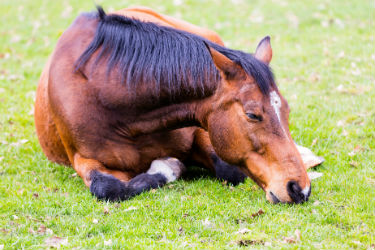Exercise, Fatigue, and Exhausted Horse Syndrome

A healthy horse trained for endurance is able to tolerate high levels of cardiovascular stress. However, when the stress is submaximal and occurs over an extended period of time, the animal may experience exhausted horse syndrome, a stress-caused fatigue of the heart and skeletal muscles.
Fatigue is a normal outcome of exercise that functions to protect the animal. If, in normally healthy and exercising animals, the mechanisms of fatigue do not occur, the animal could experience physical harm through:
- Structural damage of muscle cells and support tissues
- Dehydration
- Severe hyperthermia.
Horses trained for endurance may suffer when fatigue occurs over a prolonged period of time at submaximal intensity of exercise. Clients interested in training their horse for endurance runs may find the following information interesting.
Veterinary Checkpoints
During an endurance race, the health of a horse is examined at veterinary checkpoints or during required rest stops. Remind your clients of these signs that indicate that the animal is becoming fatigued:
- Elevated rectal temperature
- Fast heart rate
- Flared nostrils
- Rapid breathing rate.
Signs of Resting Recovery
As the animal rests, its heart and breathing rates should drop. A 15-minute rest should have the following results:
- Heart rate of less than 70 beats per minute
- Breathing rate of less than 40 breaths per minute.
If the animal has a higher heart or breathing rate, it should be rested until the rates drop.
Problems While Resting
It is important to maintain a vigilant watch on the animal as it rests. A fatigued horse may experience endurance-related myopathy that makes them unwilling or unable to move. Signs include:
- Muscle cramps
- Tremors
- Stiffness
- Anxiety
- Sweating.
If a horse shows with the following signs, it should be pulled from the race:
- Depressed
- Weakened
- Dehydrated
- Unwilling to drink
- Sweating at a reduced rate or not sweating at all
- Apathetic.
A severely fatigued animal may be unable to recover after a resting period. These animals may experience the following:
- Continued elevated heart and breathing rates
- Breathing rate that is greater than the heart rate
- Liver failure
- Kidney failure
- Death.
Treatment
A fatigued horse should receive the following care:
- Stop all activity
- Lower body temperature:
- Place the animal in a cooler environment
- Spray repeatedly with cold water
- Place ice packs or alcohol sponges on their neck, flanks and lower extremities:
- Try to get the horse to drink, but if it won’t, begin replacing fluids either intravenously or orally with a stomach tube
- Continue administering electrolytes until the animal is able to drink on its own.
Prevention
A horse loses water through its sweat and urine, but the amount lost can be impacted by:
- Intensity of stress
- Temperature
- Humidity
- Physical characteristics of animal.
Horses trained for endurance are often conditioned to frequently drink water in smaller amounts. These animals need, on average, a gallon of water every hour to alleviate thirst, cool the horse, and prevent dehydration.
If their body becomes water depleted, it also loses:
- Sodium
- Chloride
- Potassium
- Bicarbonate
- Calcium
- Magnesium.
To replace these minerals, electrolytes may need to be provided, but they should not be used as a substitute for fresh water.
Prevention of exhaustion requires paying close attention to the needs of the animal.
At Covetrus, we believe the more information veterinarians provide clients, the more likely your clients will return. Here’s some additional information that may be of interest to your clients who have horses:
New Equine Deworming Strategies
Leptospirosis in Horses
Equine West Nile Virus
Your Covetrus representative has many suggestions for protecting the health of a horse. Contact us online or at 855.724.3461.
Sources:Horse Owner’s Veterinary Handbook, 3rd ed., by T. Gore, P. Gore, J.M. Giffin The
Merck Veterinary Manual, 8th ed., Merck & Co., Inc. Whitehouse Station, NJ, U.S.A.


Working Here
Our team members are encouraged to be the best they can be... at Covetrus we believe we impact one another.
Learn MoreNews & Events
FDA Cautions Pet Owners Not to Feed Texas Tripe Inc. Raw Pet Food Due to Salmonella, Listeria Monocytogenes
The U.S. Food and Drug Administration is cautioning pet owners not to feed their pets any of the Texas Tripe brand raw frozen pet food listed below because several samples of Texas Tripe raw pet food have tested positive for Salmonella and/or L. mono.
Careers
Are you looking for a place to let your talents shine? At Covetrus, we help our practitioner customers better serve their patients and take pride in providing the best customer experience possible. Search our open positions to see our available opportunities.
Newsletter
Stay current with what’s going on with Covetrus, subscribe to receive our newsletter and email communications. Subscribers will receive the latest information in practice management, sales and marketing, animal health, and more.



-3-(1).png?sfvrsn=2d806d73_0)

Leave a comment